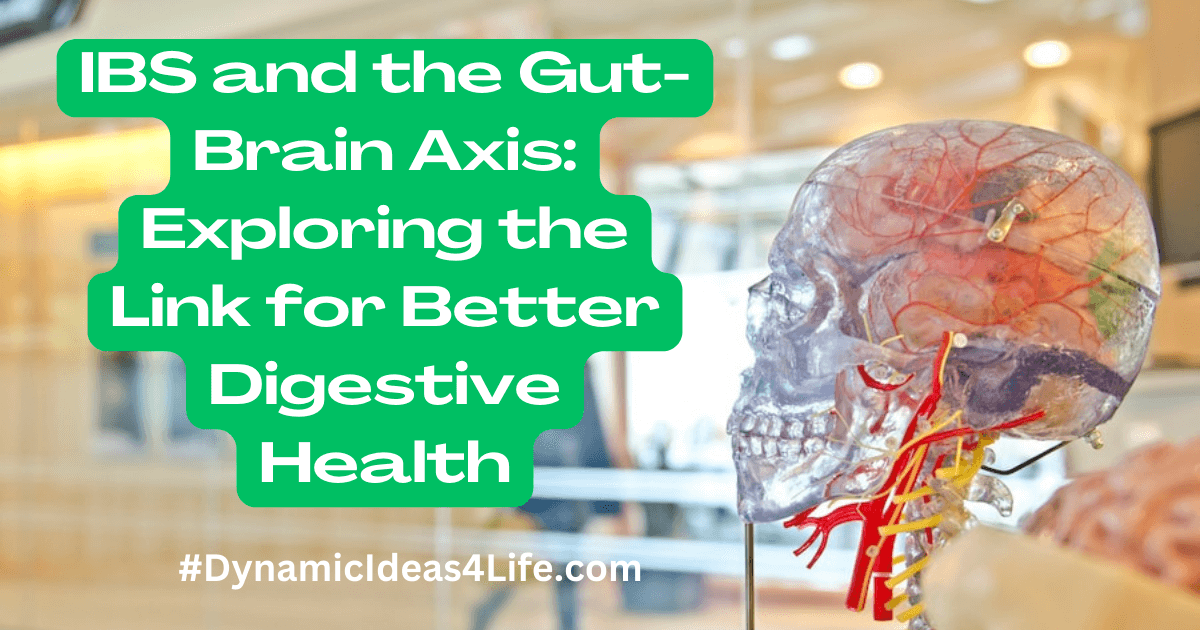The gut-brain axis is a complex and intricate system that plays a crucial role in overall health. It refers to the bidirectional communication between the brain and the gut, and it has been found to have a significant impact on various aspects of our well-being, including digestion, mood, and immune function.
One condition that is closely linked to the gut-brain axis is irritable bowel syndrome (IBS). IBS is a common gastrointestinal disorder characterized by symptoms such as abdominal pain, bloating, and changes in bowel habits. In this article, we will explore the connection between the gut-brain axis and IBS, and how understanding this relationship can lead to improved management of IBS symptoms.
Understanding the Gut-Brain Axis: How the Brain and Gut Communicate
The gut-brain axis involves a complex network of communication between the brain and the gut. This bidirectional communication occurs through various pathways, including the enteric nervous system (ENS) and the vagus nerve. The ENS is often referred to as the “second brain” because it contains millions of neurons that are responsible for regulating digestion.
It can function independently of the central nervous system (CNS), but it also communicates with the brain through neural pathways.
The vagus nerve is another important component of the gut-brain axis. It is the longest cranial nerve in the body and connects the brain to various organs, including the gut. The vagus nerve plays a crucial role in regulating digestion and transmitting signals between the brain and the gut.
It carries information about the state of the gut to the brain, and it also sends signals from the brain to the gut, influencing its function.
The Role of the Gut Microbiome in Irritable Bowel Syndrome (IBS)
The gut microbiome refers to the trillions of microorganisms that reside in our digestive tract. These microorganisms play a crucial role in maintaining digestive health and overall well-being.
Research has shown that there is a link between gut dysbiosis, an imbalance in the gut microbiome, and IBS symptoms. Studies have found that individuals with IBS often have an altered composition of gut bacteria compared to healthy individuals.
The exact mechanisms by which gut dysbiosis contributes to IBS symptoms are still not fully understood. However, it is believed that the imbalance in gut bacteria can lead to increased intestinal permeability, inflammation, and changes in gut motility, all of which are associated with IBS symptoms.
Additionally, certain species of bacteria in the gut produce metabolites that can affect the function of the ENS and the brain, further contributing to IBS symptoms.
Research on the gut microbiome in IBS has led to potential treatment options targeting the microbiome. Probiotics, which are live bacteria that confer health benefits when consumed, have shown promise in managing IBS symptoms. Certain strains of probiotics have been found to improve symptoms such as abdominal pain and bloating in individuals with IBS.
Prebiotics, which are non-digestible fibers that promote the growth of beneficial bacteria in the gut, have also been studied for their potential benefits in IBS management.
Unraveling the Connection through the Gut-Brain Axis
Stress is a well-known trigger for IBS symptoms. Many individuals with IBS report that their symptoms worsen during times of stress or anxiety. This connection between stress and IBS can be explained through the gut-brain axis. Stress activates the hypothalamic-pituitary-adrenal (HPA) axis, which is a complex system involving the hypothalamus, pituitary gland, and adrenal glands.
The HPA axis is responsible for regulating our response to stress.
When we experience stress, the HPA axis releases stress hormones such as cortisol and adrenaline. These hormones can have a direct impact on the gut, leading to changes in gut motility, increased intestinal permeability, and alterations in the gut microbiome.
Additionally, stress can also affect the brain’s perception of pain, making individuals with IBS more sensitive to gastrointestinal discomfort.
Managing stress is an important aspect of IBS treatment. Various stress management techniques have been found to be effective in reducing IBS symptoms.
These include relaxation techniques such as deep breathing exercises, meditation, and yoga. Cognitive-behavioral therapy (CBT) has also been shown to be beneficial in managing stress and improving IBS symptoms. CBT helps individuals identify and change negative thought patterns and behaviors that contribute to stress and anxiety.
The Link Between Neurotransmitters and IBS
Neurotransmitters are chemical messengers that transmit signals between neurons in the brain and throughout the body. They play a crucial role in regulating various bodily functions, including digestion. Imbalances in neurotransmitters have been found to be associated with IBS symptoms.
One neurotransmitter that has been extensively studied in relation to IBS is serotonin.
Serotonin is often referred to as the “happy hormone” because it is involved in regulating mood and feelings of well-being. However, serotonin also plays a crucial role in regulating gut motility and sensitivity.
Research has shown that individuals with IBS often have lower levels of serotonin in their gut compared to healthy individuals.
Other neurotransmitters that have been implicated in IBS include dopamine, norepinephrine, and gamma-aminobutyric acid (GABA). Imbalances in these neurotransmitters can affect gut motility, visceral sensitivity, and inflammation, all of which are associated with IBS symptoms.
Targeting neurotransmitter imbalances is a potential treatment approach for managing IBS symptoms. Medications that modulate neurotransmitter levels, such as selective serotonin reuptake inhibitors (SSRIs) and tricyclic antidepressants (TCAs), have been found to be effective in reducing IBS symptoms.
However, these medications may have side effects and are not suitable for everyone. Therefore, it is important to work with a healthcare professional to determine the best treatment approach for each individual.
Gut-Brain Axis Dysregulation: A Potential Cause of IBS
Gut-brain axis dysregulation refers to an imbalance or disruption in the communication between the brain and the gut. This dysregulation can lead to various gastrointestinal symptoms, including those associated with IBS. The exact causes of gut-brain axis dysregulation in IBS are still not fully understood, but several factors have been identified as potential contributors.
One factor that can disrupt the gut-brain axis is chronic inflammation.
Inflammation in the gut can lead to changes in gut motility, increased intestinal permeability, and alterations in the gut microbiome, all of which can contribute to IBS symptoms. Chronic stress and psychological factors such as anxiety and depression have also been found to disrupt the gut-brain axis and contribute to IBS symptoms.
Other potential causes of gut-brain axis dysregulation in IBS include genetic factors, environmental factors such as exposure to toxins, and dietary factors such as a high intake of processed foods and a low intake of fiber. Understanding the underlying causes of gut-brain axis dysregulation is crucial for developing targeted treatment approaches for individuals with IBS.
The Impact of Diet on the Gut-Brain Axis and IBS
Diet plays a crucial role in the health of the gut-brain axis and can have a significant impact on IBS symptoms. Certain foods have been found to trigger or worsen symptoms in individuals with IBS.
These include high-fat foods, spicy foods, caffeine, alcohol, and artificial sweeteners.
One dietary approach that has shown promise in managing IBS symptoms is the low FODMAP diet. FODMAPs are a group of carbohydrates that are poorly absorbed in the small intestine and can ferment in the colon, leading to symptoms such as bloating, gas, and diarrhea.
The low FODMAP diet involves restricting foods that are high in FODMAPs for a period of time and then gradually reintroducing them to identify individual triggers.
In addition to avoiding trigger foods, it is also important to focus on consuming a balanced and nutritious diet that supports gut health. This includes eating a variety of fruits, vegetables, whole grains, lean proteins, and healthy fats. Consuming adequate fiber is particularly important for maintaining regular bowel movements and supporting the growth of beneficial bacteria in the gut.
How Gut Inflammation Affects IBS
Inflammation is a key factor in the development and progression of many diseases, including IBS. Chronic inflammation in the gut can lead to changes in gut motility, increased intestinal permeability, and alterations in the gut microbiome, all of which are associated with IBS symptoms.
The gut-brain axis plays a crucial role in regulating inflammation in the gut. The ENS and immune cells in the gut communicate with each other through various signaling molecules, including cytokines. Imbalances in these signaling molecules can lead to chronic inflammation and contribute to IBS symptoms.
Research has shown that individuals with IBS often have higher levels of pro-inflammatory cytokines in their gut compared to healthy individuals. This suggests that targeting inflammation may be a potential treatment approach for managing IBS symptoms.
Anti-inflammatory medications such as nonsteroidal anti-inflammatory drugs (NSAIDs) have been studied for their potential benefits in IBS management. However, these medications may have side effects and should be used under the guidance of a healthcare professional.
The Gut-Brain Axis and Visceral Hypersensitivity
Visceral hypersensitivity refers to an increased sensitivity to pain and discomfort in the internal organs, including the gut. It is a common feature of IBS and can contribute to the abdominal pain and discomfort experienced by individuals with the condition.
The gut-brain axis plays a crucial role in regulating visceral sensitivity. The ENS and the brain communicate through neural pathways, and alterations in this communication can lead to increased sensitivity to gastrointestinal stimuli. Stress and psychological factors such as anxiety and depression can also contribute to visceral hypersensitivity.
Targeting visceral hypersensitivity is an important aspect of managing IBS symptoms. Medications that modulate pain perception, such as tricyclic antidepressants (TCAs) and selective serotonin reuptake inhibitors (SSRIs), have been found to be effective in reducing visceral hypersensitivity and improving IBS symptoms.
Additionally, relaxation techniques such as deep breathing exercises and meditation can help reduce stress and improve pain perception.
The Gut-Brain Axis and Motility Disorders
Motility disorders refer to abnormalities in the movement of the digestive tract. They can manifest as changes in bowel habits, such as diarrhea or constipation, which are common symptoms of IBS.
The gut-brain axis plays a crucial role in regulating gut motility, and dysregulation of this axis can contribute to motility disorders in individuals with IBS.
The ENS, which is part of the gut-brain axis, is responsible for coordinating the contractions of the muscles in the digestive tract. It receives signals from the brain and sends signals back to regulate gut motility.
Imbalances in neurotransmitters, inflammation, and alterations in the gut microbiome can all affect gut motility and contribute to motility disorders in individuals with IBS.
Targeting motility disorders is an important aspect of managing IBS symptoms. Medications that regulate gut motility, such as antispasmodics and prokinetics, have been found to be effective in reducing symptoms such as abdominal pain and bloating.
Additionally, dietary changes, such as increasing fiber intake and staying hydrated, can help regulate bowel movements and improve gut motility.
Targeting the Gut-Brain Axis for Improved Management of IBS Symptoms
The gut-brain axis plays a crucial role in the development and progression of IBS symptoms. Understanding the complex interactions between the brain and the gut can lead to improved management of IBS symptoms.
By targeting various components of the gut-brain axis, such as the gut microbiome, stress, neurotransmitters, gut-brain axis dysregulation, diet, inflammation, visceral hypersensitivity, and motility disorders, it is possible to develop personalized treatment approaches for individuals with IBS.
Current research in this field is focused on identifying biomarkers that can help predict treatment response and developing targeted therapies that address the underlying causes of IBS symptoms.
For example, researchers are studying the use of fecal microbiota transplantation (FMT) to restore a healthy balance of gut bacteria in individuals with IBS.
Other potential treatment approaches being explored include neuromodulation techniques, such as transcutaneous electrical nerve stimulation (TENS), and novel medications that target specific components of the gut-brain axis.
In Conclusion
The gut-brain axis is a complex system that plays a crucial role in overall health. Understanding the connection between the brain and the gut can provide valuable insights into the development and management of conditions such as irritable bowel syndrome (IBS).
By targeting various components of the gut-brain axis, including the gut microbiome, stress, neurotransmitters, gut-brain axis dysregulation, diet, inflammation, visceral hypersensitivity, and motility disorders, it is possible to develop personalized treatment approaches for individuals with IBS.
However, still, It is important for individuals experiencing IBS symptoms to seek professional help and explore the potential benefits of targeting the gut-brain axis in their management plan.




Anxiety and Depression best ways to lower blood sugar BiOptimizers blood pressure supplements blood sugar support supplements Digestive Enzymes Supplement digital products Dr Sam Robbins Erectile dysfunction Exercise Gut Health Healthy Living heart health HFL how to lower blood sugar levels How To Lower Cholesterol insulin resistance joint health supplement Keto keto dieting Keto Diet Weight Loss leaky gut supplements leptin resistance list Magnesium deficiency Matt Gallant mental health multivitamins Nootropics nutrient supplements Probiotics Probiotic Supplements proteolytic enzymes reverse type 2 diabetes stress and anxiety stress relief vitabalance vitapost Wade Lightheart weight loss articles weight loss diet plans weight loss product reviews weight loss supplements weight loss supplements that work weight loss tea
